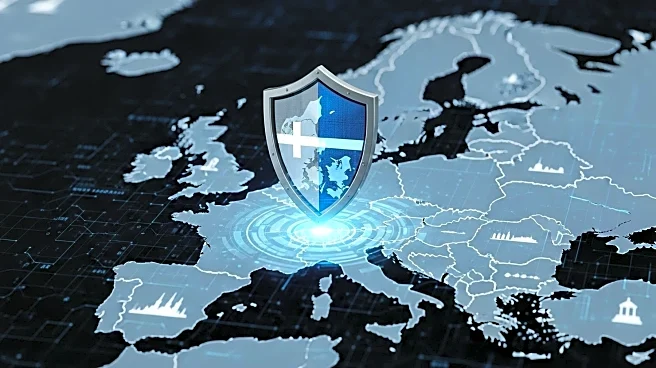What's Happening?
Denmark's Prime Minister Mette Frederiksen has issued a warning about Russia's hybrid warfare tactics against Europe, as EU leaders gather in Copenhagen for security discussions. Recent incidents involving Russian drones breaching Polish airspace and NATO jets escorting Russian warplanes out of Estonia have heightened concerns about the preparedness of the alliance. The summit follows a series of drone-related disruptions at Danish airports and military bases, prompting increased security measures. European nations, including France, Germany, and the UK, have sent military support to Denmark, while Ukraine has dispatched a mission for joint exercises. The summit aims to address Europe's defense capabilities and strategies to counter Russian aggression, with discussions expected to focus on military and financial support for Ukraine.
Why It's Important?
The warning from Denmark underscores the growing threat of hybrid warfare tactics employed by Russia, which could destabilize European security. The incidents involving Russian drones and warplanes highlight vulnerabilities in NATO's defense systems and raise questions about the alliance's readiness to respond to such threats. As the United States shifts its focus to Asia, European nations may need to bolster their own defense capabilities to counter Russian aggression. The summit's discussions on using frozen Russian assets to support Ukraine and the country's potential EU membership could have significant implications for European security and geopolitical dynamics. The situation also tests the commitment of NATO members, particularly in light of President Trump's stance on Ukraine's NATO membership.
What's Next?
EU leaders are expected to continue discussions on enhancing military and financial support for Ukraine, as well as exploring new defense strategies to counter Russian threats. The proposal to use frozen Russian assets for Ukraine's aid will be a key topic, alongside the country's prospects for EU membership. The summit will also address broader security issues, including trafficking and migration, with leaders from the European Political Community participating in informal and formal talks. The outcomes of these discussions could shape Europe's defense policies and its approach to Russian aggression in the coming years.
Beyond the Headlines
The hybrid warfare tactics employed by Russia pose ethical and legal challenges for European nations, as they navigate the complexities of international law and sovereignty. The increased military presence and joint exercises in Denmark reflect a shift towards greater collaboration among European nations to address security threats. The summit's focus on innovation and rearming highlights the need for technological advancements in defense systems, particularly in drone warfare. The geopolitical implications of Ukraine's potential EU membership and the use of frozen Russian assets could redefine Europe's relationship with Russia and influence future diplomatic strategies.











